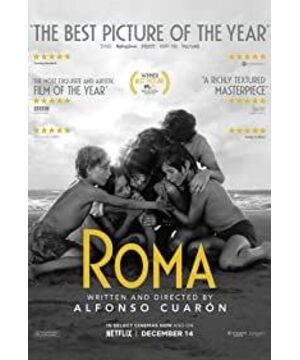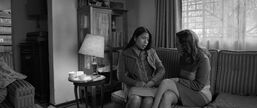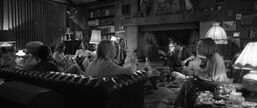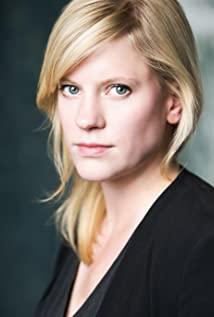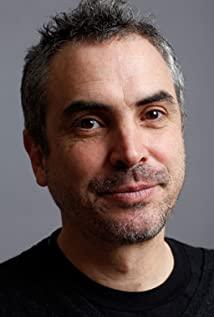Mexican director Alfonso Cuarón’s first work "Rome" since "Gravity" in 2013 has attracted much attention before it appeared on the screen. Due to the "bad origin" of the publisher Netflix, this masterpiece It was rejected by Cannes early-but it did not affect its comeback this fall. It premiered in Venice a few days ago, and its reputation is very good. Then, it will also appear in Telluride, Toronto, New York and London, becoming the "absolute main force" of major film festivals. Before the Oscars of this season has been fully opened, some people have regarded it as a strong contender for the best film. You know, this is a great affirmation for a non-English work. The last one that received the same nomination was Haneke's French work "Love" six years ago.
Interestingly, the connection between "Rome" and "Love" is not only in the filming language-the names of the two films actually differ by one letter ("Amor" vs. "Amour"), which means "love" in French. "(Amour) is "Amor" in Spanish, and when these four letters are reversed, it becomes the title of the film we see now: ROMA.
As the name suggests, this is a work filled with Kalong's love. The protagonist of the story is Cleo, a maid/nanny in a middle-class family in Mexico City. The story is based on Caron’s childhood experience, so one of the four children in the film must be the director himself-he was less than ten years old at that time. The movie focuses on the 1970s, with Cleo's bitter love experience, and her hostess Sofia's rejection by her husband as the main axis, and delicately and melodiously portrays the family's life experience. At the same time, the director also used a short space to explain the social turmoil at that time: street fighting on the streets of Mexico City, gunfire, and artillery fire, taking us further to perceive the small individuals in the torrent of that era-especially women and children, they seem to be peaceful The difficulty and trauma behind life.
However, "Rome" is not simply a re-creation of Caron's personal memory. The shooting of the entire film, and the Cleo we see on the screen today, is a kind of "re-creation" for the director. The details of the life of the nanny back then, the thoughtfulness and meticulousness of her heart, the emotional throbbing behind her, and the grief of losing her daughter, presumably could not be observed and experienced by a ten-year-old child. There is a section in the film that fully describes how Cleo turned off all the lights in the house one by one before going to bed, and this very poetic 360-degree long lens was naturally not what Caron saw in his childhood. "Rome" is not so much the director's retrospective of the past, as it is a restoration. He himself also said that during the preparation process, he had called Cleo many times and talked about many details, in order to restore her life track and mental state as much as possible, even when she was busy in the kitchen, what she listened to was I have found out all the songs clearly. Therefore, for Caron, bringing the nanny who raised him to the screen is not only a review of his past, but also a process of recognizing an ordinary woman.
In fact, as early as ten years ago, Caron had the idea of making this film, and the reason for the delay in action was because he was not ready yet—not technically, but emotionally: Ten Years ago, he was obviously not absolutely sure to express this feeling completely, and it takes a bit of detachment and distance to shoot an intimate character. Polanski didn't use "The Pianist" to uncover the scars of his childhood until he was 70, and his feelings must be quite similar.
Therefore, what we see in "Rome" is a calm and mature atmosphere. This private memory and looking back on the past are neither exhaustive questioning nor wishful thinking, but consistently based on the meticulous care of Cleo. The woman who brought up Caron was actually taken care of in this movie. The director personally took the shot and used delicate and trickling images to show us how he, who knows his destiny, defines his past, and how he cherishes this emotion that is no different from maternal love. Cleo in the film is humble and unremarkable, but he is always "held in the palm of my hand". In the tide of life, the weak happiness experienced by this little character has not been over-exaggerated, and the pain and pain have not been cruelly magnified. The tone of the movie is always in a proper balance. Our Cleo walks through the dense traffic like a sparrow when he is happy, and when he is worried, he leaned against the white wall of the picture frame and watched her boyfriend perform martial arts naked, and when he was helpless, he was sitting on his side next to the hostess Sophie. I shed tears and waited to confess my misfortune. When I was brave, I braved the waves that were higher than my body and moved forward bravely. When I was calm, I didn’t say a word. I sat in the car and looked out the window and recalled the catastrophe I had just experienced not long ago. . The story in "Rome" does not have a particularly strong dramatic conflict, but we still walk into Cleo's inner world without reservation. This mediocre heroine, even a bit shy when she laughs, was given a very shining humanity by the director.
From an audiovisual point of view, the inherent power of this movie is also extremely powerful. Today, with such emphasis on narrative and storytelling, Caron uses his iconic long lens to restore the original beauty of film as an art form for us. The beginning of the film is endlessly memorable, even reminiscent of Tarkovsky's opening in "Homesickness". When the subtitles were shown, the camera always focused on the floor of the inner courtyard of the house-and it was a very small part, and I didn't even think it was the floor if I didn't look carefully. Then we saw the water flow across, covering the entire surface, soap foaming up, and the floor being washed clean. During this process, the camera was completely still, and Cleo naturally did not appear in the lens. After the subtitles were finished, the camera slowly lifted, and a peaceful and beautiful Mexican house gradually came into view. The camera turned parallel to the gate of the house, and slowly passed 180 degrees to the main house. At this time, the character came out, and Cleo walked into our field of vision from the side of the screen just after brushing the floor. After she entered the room, she took something and walked out again. The camera followed her and turned 90 degrees, then boarded it. The roof was raised again, and we saw the sky above the eaves and the clothes rails with white clothes hanging on the side. This shot lasted for several minutes, without a word in the middle, and Cleo did not show his face, but at the end we had a clear view of every corner of the house, Cleo’s identity and living conditions.
There are many examples of this in the film. Caron is almost obsessed with placing the camera in the center of the living room and rotating it 360 degrees to explain the movement of the characters. Except for the aforementioned "turn off the lights" paragraph, the scene where the child was asked to go back to the house before the meeting with Sophie and the scene where he sang and danced in a country hotel were also the same. Through this lens design, the director maximizes the connection between our perspective and Cleo's life, and through deliberately suppressed rhythm to convey a restrained power, so that we are further immersed in this sincere emotion.
Of course, "Rome" is not blindly pursuing soothing and timelessness. Caron's mastery of the film is still reflected in the last half hour, which is also a relatively intense half hour of plot conflict. The reactionary armed street riots and gunmen rushing in, disturbed Cleo, who was buying a crib in the mall, and shattered her vision of a new life. Then, the tragedy came, the anxious horn sounded across the sky on the way to the hospital, and the emergency rescue in the hospital, which pushed the film to the first climax in one fell swoop. Especially the latter, from the beginning to the end, only two long shots explained the whole process, and quietly pushed the emotions from tension to suffocation to silent sorrow, all in one go, which made people amazed.
Just when we thought that the movie would slowly end after this tragedy, Caron further "tightened" the storyline through the scene of rescue of the child by the sea. This was also the second climax in just half an hour. That side following Cleo stepped into the sea, into the sea, almost submerged by the sea, and then holding the child out of the waves difficultly can only be described as shock. This seemingly simple panning long lens, but in every two strokes, generally caused countless waves in our hearts. In the process, we could only hear Cleo's shouts and the sound of surging waves. Just like the "Doomsday Mirror" at the end of "Son of Man", the director's ability to express extreme emotions through the most basic audiovisual language once again demonstrated.
Finally, let's talk about the theme of the movie. In fact, I don’t think that the political events explained in the film and the reaction of the two women (Sophie and Cleo) to the abandonment of men are the original intention of Caron’s story, especially when he is standing in Cleo. From a perspective, this is even more so. The fate of the country behind the beating, smashing, looting and burning is too far away for her. Women's liberation may be an unfamiliar concept to her. In the final analysis, the house full of sorrows, joys and love, the children who she cares for and wears her with love, and the pursuit of love outside the courtyard, is the whole life. I think the so-called social significance of this film does not lie in the superficially "social attributes" of the plot, but in the director's perspective when portraying this ordinary woman. Cleo in life may really be just a "mother" character for Caron, but in this movie, and also through this movie, Cleo has become a more complete person—— She is fragile and fearful, but also brave and strong, not just a "mother". I think this perspective is more precious than freedom and liberation. After all, for a woman, getting a right look and gaze is the most sincere respect.
View more about Roma reviews


